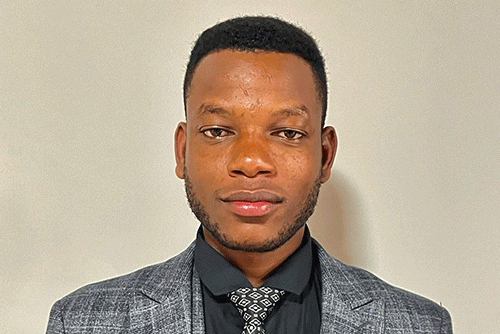Lahja Nashuuta
Naapopye Anatoly Uulenga is a public servant in the education ministry with hearing impairment.
He is a sign language instructor of design and technology as well as natural science.
He said “I believe it is crucial for individuals with hearing impairments to communicate effectively through sign language. I strive to raise awareness among ministers regarding the importance of recognising sign language within the National Assembly and Parliament. This recognition would facilitate the provision of interpreting services, enabling deaf individuals to comprehend election processes and political speeches broadcast on television”.
Uulenga is also an accomplished author and motivational speaker. He presents on TEDx, a renowned international platform for inspirational talks.
Humble beginnings
Uulenga was born and raised in Grootfontein, a small town located in north-central Namibia.
He developed a fondness for watching quality films with English subtitles.
“I have a particular admiration for motivational speakers, notably Steven and Daniel Washington on YouTube, whose messages encourage me to transform my mindset and life. To assist Namibians in shifting their perspectives from negativity to positivity, I have started compiling inspirational quotes in a personal notebook,” he expressed. He did not attend a conventional school. Subsequently, he advanced to Cosmos High School, which accommodates both hearing-impaired students and their hearing peers in grades 11 and 12.
Uulenga proceeded with his education to the University of Namibia to pursue a degree in education.
Joining public service
His passion for contributing to government work motivated him to join public service.
He said “My decision to pursue a career in public service stemmed from a desire to enhance awareness across all regions about the abilities of individuals with disabilities, including those who are deaf, deaf-blind or blind. It has always been my aspiration to serve in the government, which ought to ensure the provision of quality services and accessible employment opportunities for individuals with disabilities as well as for the broader community”.
He highlighted the challenges he encounters in his professional role as a hearing-impaired individual.
He elaborated that “the most daunting aspect of my work is recognising and confronting my limitations. Teaching basic vocabulary poses a challenge as well. When I sometimes sign and instruct on certain words, students become distracted, despite my efforts to encourage them”.
“Moreover, the existing curriculum does not adequately accommodate deaf learners, as it incorporates components such as phonics and rhymes, which deaf students cannot hear and replicate as needed,” he added.
Nevertheless, he finds personal rewards in his profession. “The most gratifying element of my work is my enthusiasm for teaching mathematics and science. Teaching provides me with a sense of fulfilment. I take pleasure in interacting with the students, fostering an enjoyable learning environment for both parties,” he said.
Misconception
In response to the prevalent misunderstanding regarding the capabilities of public servants, Uulenga said, “There is a significant misconception surrounding deaf learners, especially among individuals who lack awareness of their specific needs. Deaf learners often require additional time to concentrate in class, as their hearing limitations hinder their ability to engage
with listening-based assessments, particularly in subjects such as English at grades 10 and 12”.
The educator elaborated that hearing-impaired students are required to take the same Namibia Senior Secondary Certificate Ordinary level and Advanced Subsidiary examinations.
He said deaf learners frequently achieve lower scores in English due to the substantial differences between their primary language, sign language and English.
Uulenga intends to continue his career for at least another decade before considering early retirement.
“I am deeply committed to inspiring and supporting deaf learners in completing their education. Nevertheless, I do not wish to retire from teaching at 60,” he noted.
On his agenda, he aims to pursue a master’s degree in inclusive education or sign language linguistics. -lnashuuta@gmail.com



